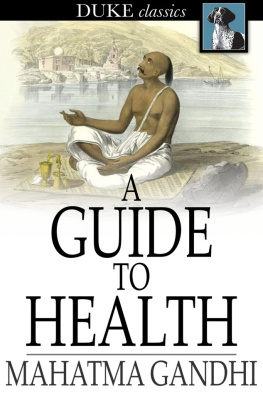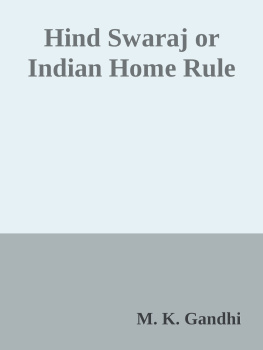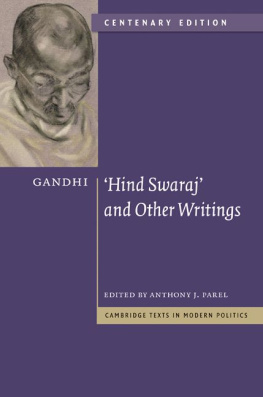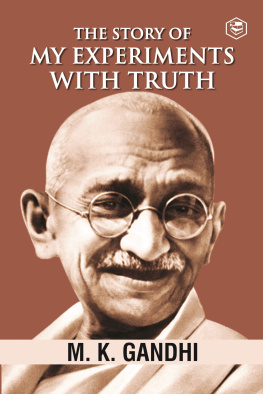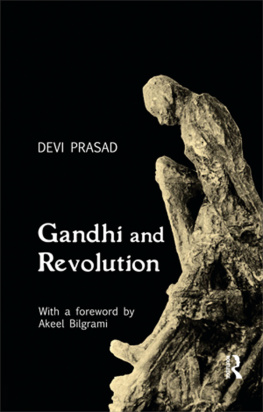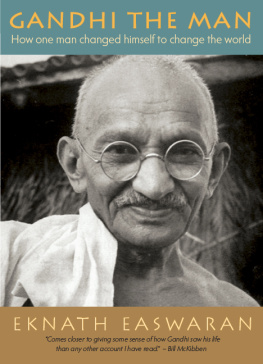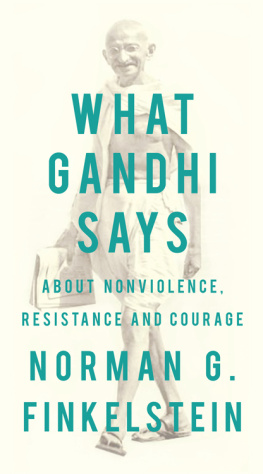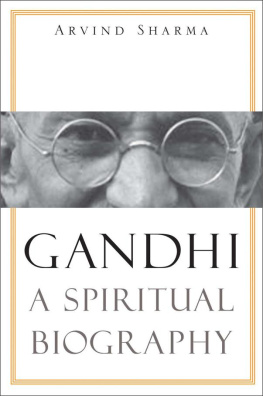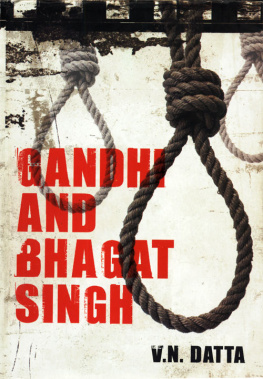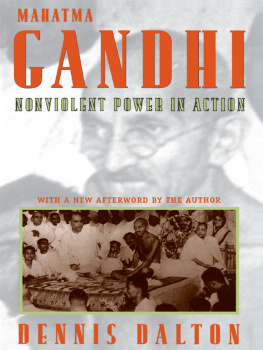THOMAS MERTONtitles
available from New Directions
THE ASIAN JOURNAL
BREAD IN THE WILDERNESS
COLLECTED POEMS
GANDHI ON NON-VIOLENCE
THE GEOGRAPHY OF LOGRAIRE
LITERARY ESSAYS
MY ARGUMENT WITH THE GESTAPO
NEW SEEDS OF CONTEMPLATION
RAIDS ON THE UNSPEAKABLE
IN THE DARK BEFORE DAWN: NEW SELECTED POEMS
THOMAS MERTON IN ALASKA
THOUGHTS ON THE EAST
THE WAY OF CHUANG TZU
THE WISDOM OF THE DESERT
ZEN AND THE BIRDS OF APPETITE
GANDHI ON NON-VIOLENCE
SELECTED TEXTS
FROM MOHANDAS K. GANDHIS
Non-Violence in Peace and War
Edited,
with an introduction, by
THOMAS MERTON
Preface by
MARK KURLANSKY
A NEW DIRECTIONS BOOK
Copyright 1964, 1965 by New Directions Publishing Corporation.
Preface copyright 2007 by Mark Kurlansky
Frontispiece: linoleum block print of Gandhi by Mark Kurlansky.
All rights reserved. Except for brief passages quoted in a newspaper, magazine, radio, television, or website review, no part of this book may be reproduced in any form or by any means, electronic or mechanical, including photocopying and recording, or by any information storage and retrieval system, without permission in writing from the Publisher.
This book is published by the permission of the Navajivan Trust, P. O. Navajivan, Ahmedabad-14 (India), which controls the copyright in all works by M. K. Gandhi.
The excerpt from the poem In Silence by Thomas Merton, from The Collected Poems of Thomas Merton, copyright 1957 by The Abbey of Gethsemmani. Reprinted by permission of New Directions Publishing Corp.
First published as New Directions Paperbook 197 in 1965.
Reissued as New Directions Paperbook 1090 in 2007.
Published in Canada by Penguin Books Canada Limited.
Library of Congress Cataloging-in-Publication Data
Gandhi, Mohandas, 18691948
Gandhi on non-violence : selected texts from Mohandas K. Gandhis non-violence in peace and war / edited with an introduction by Thomas Merton : preface by Mark Kurlansky/
p. cm.
Originally published: New York : New Directions, 1965.
Includes bibliographical references and index.
eISBN 978-0-8112-2012-5
1. Nonviolence. I. Merton, Thomas, 19151968 II. Gandhi, Mahatma,
18691948. Non-violence in peace and war 19421949. III. Title.
HM1281.G34 2007
179.7dc22
2007932262
NEW DIRECTIONS BOOKS ARE PUBLISHED FOR JAMES LAUGHLIN BY NEW DIRECTIONS PUBLISHING CORPORATION 80 EIGHTH AVENUE, NEW YORK, NEW YORK 10011
CONTENTS
Everyone who hates his brother is a murderer.
I JOHN, 3:15
Men who fear to make the sacrifice of love will have to fight.
TOYOHIKO KAGAWA
The great tasks of magnanimous mento establish with truth, justice, charity and liberty, new methods of relationships in human societythe task of bringing about true peace in the order established by God. We publicly praise such men and earnestly invite them to persevere in their work with ever greater zeal. It is an imperative of duty; it is a requirement of love.
POPE JOHN XXIII, Pacem in Terris
PREFACE
I AMUSE MYSELF speculating what Sigmund Freud would have made of Mohandas Karamchand Gandhi had he gotten him on his couch. The two lives did overlap in time if not in geographic or intellectual space. Gandhi seems like a Freudian feast, starting with his life-long guilt over having been engaged in sex with his wife at the moment of his fathers death. His life was a constant illustration of Freuds thesis that we cannot be happy because our inherent nature is contrary to the demands of our conscience or, as Freud put it, our ego is at war with our superego.
Engaged in this struggle, Gandhi chastised and denied himself in a variety of ways. His meager vegetarian diet of only raw food was justified because his nourishment was taken in its vital state even as animals dobut, of course only herbivorous animals. Carnivorous beasts were far too indulgent for his taste. He even regularly fasted from this uncooked unseasoned diet. At the time of his famous salt marchwhen he rallied common Indians against British restrictions on making salthe was personally eliminating salt from his diet. He persuaded attractive young women to sleep with him so that he could refrain from touching them (certainly this would have gotten Dr Freuds attention). He also rejected earthly possessions and at his death owned a pair of glasses, a pair of sandals, a bowlfew enough items to be gathered in two hands. The closest he had to a frivolous possession was statues of the three wise monkeysHear No Evil, See No Evil, and Speak No Evila Buddhist motif from Japan.
It seems certain that Freud would, at the least have found Gandhi either ignorant of, or willfully ignoring, the nature of the human psyche. For Freud opined:
The commandment Love thy neighbor as thyself is the strongest defense against human aggression and an excellent example of the unpsychological manner in which the cultural super-ego proceeds. It is impossible to keep this commandment; such a huge inflation of love can only lower its value, not remove the problem.
Yet Gandhi also knew the commandment was impossible to keep. He wrote, There will never be an army of perfectly nonviolent people. It will be formed of those who will honestly endeavor to observe non-violence.
After Martin Luther King Jr. was killed in 1968, a cartoon by Bill Mauldin ran in The Chicago Sun Times showing Gandhi talking to King. The caption read, The odd thing about assassins, Dr. King, is that they think theyve killed you. By the time of Kings death it was obvious that the Hindu who had ended Gandhis life twenty years before, an assassin whose name was already largely forgotten, had failed to end the role in the world of the man who Nobel Prize winning writer, Rabindranath Tagore had dubbed mahatma, the great soul.
My nomination for the most influential political leader of the twentieth century would be Mohandas K. Gandhi. The first thing that seems slightly jarring about this proposal is that most people do not customarily think of Gandhi as a political leader. There is a tendency to think of him as a religious or spiritual leader. This is the odd thing about political assassinations: they tend to turn political leaders into spiritual ones, even into saintsit makes them less threatening. King has suffered the same fate. But Gandhi, like King, was first and foremost a man of political action. He profoundly believed in the moral obligation to act. To Gandhi, the greatest sin is to fail to act. Violence is any day preferable to impotence, he wrote. There is hope for a violent man to become non-violent. There is no hope for the impotent.
Who, if not Gandhi, might be the most important political leader of the twentieth century? Political leaders, on the whole, are not an imaginative lot. Now that we live in an age of film and recordings, the tendency is to openly imitate successful predecessors. American leaders cannot do Lincoln impressions, but they can try to sound like Roosevelt or Kennedy. British prime ministers do their Churchill and French presidents flirt with De Gaulle mimicry. Indians leaders try to sound like Gandhi, though unfortunately they do not think or act like him. But among all these political leaders, both the originals and the imitations, there is very little that is new. Only Gandhi represents a completely different way of pursuing political objectives.
Next page

